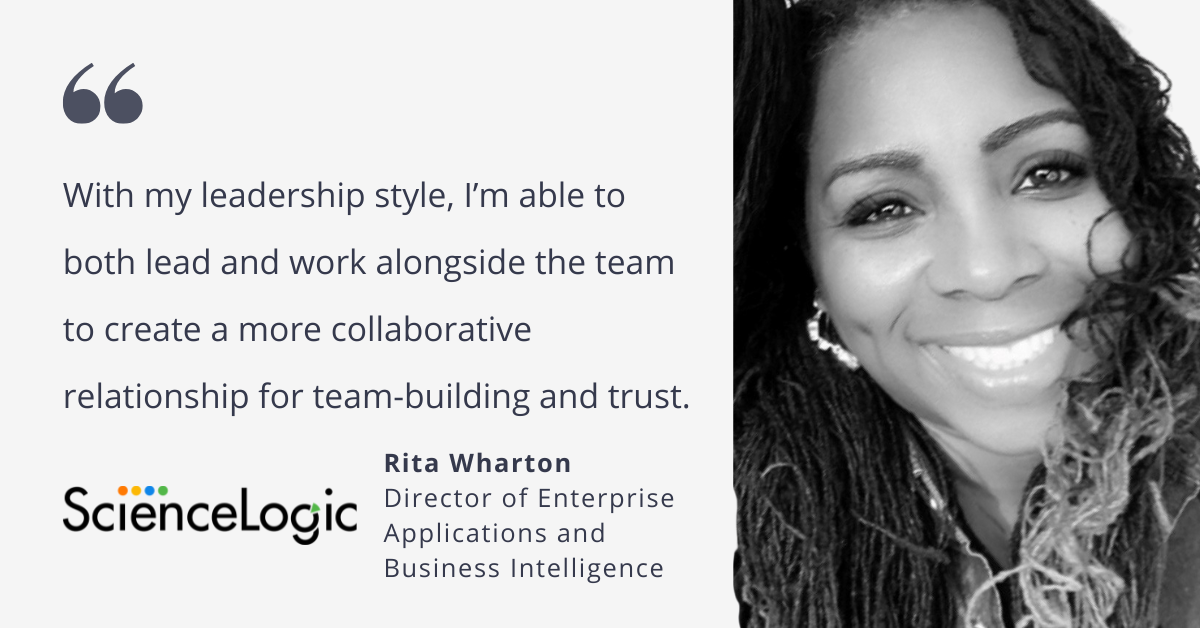Rita Wharton defines her leadership style as “servant-leader.” According to her, “being a servant-leader means not only being able to lead but also making an effort to relate to the people you're asking to follow you.”
She does so in both her leadership positions at work and in her community.
“I'm a Girl Scout leader working with young women, encouraging them to be in touch with their community and helping them achieve what they can through the Girl Scout experience,” Rita shares.
When she’s not guiding young minds, she’s focused on leading her team as a Director of Enterprise Applications and Business Intelligence at ScienceLogic.
We sat down with Rita to learn what it means to be a servant-leader in practice and how this type of leadership style has shaped her career.
The People Behind the Solutions
Rita believed that pursuing an engineering degree would lead to endless career possibilities. Once she completed her degree in electrical engineering, she realized her connection was working with the people behind the solutions, and less on being “the” engineer.
“I love putting things together and taking things apart but soon realized through my studies, I didn’t want to be an engineer,” she explains. “My summer internships helped me realize I enjoyed working with technical people–hearing how they think, seeing how they build solutions to solve business problems.”
Through networking with college alumni, Rita landed a role as a product marketing engineer where she was the liaison between the customers who buy the product, the people who sell the product, and the engineers who build it.
“I found that my passion was being that conduit between the technical community, sales team, and our customers, and being able to simply translate how our technology was used to solve business problems,” she says.
Within this role, she was able to experience both the business and marketing side of technology early in her career, and continued to grow and develop her skills, primarily in the networking and IT industry. When she joined ScienceLogic, she expanded her capabilities.
Developing Her Leadership Skills at ScienceLogic
Rita began working at ScienceLogic as a consultant. When the company started to grow, she saw an opportunity to explore a new career path.
“I decided to transition to a full-time position as a project manager,” she says. “Two ladies and I came together to form the charter project management organization (PMO) at ScienceLogic.”
With a permanent position, Rita began to take advantage of available career opportunities.
“I managed customer deployments with the project team,” she recounts. “I took my experience and worked with the project managers to lead the transition of our disparate project management ‘tools’ into a single application. This helped us gain efficiencies and real-time visibility into project status information and access to executive dashboards.”
Rita was also involved in the SL1 deployments for large, strategic accounts.
“Sometimes you have an atypical problem because of the size and complexity of the deployment, and the answers aren’t necessarily in the product manual,” she points out.
When there is no obvious solution, it takes a leader to bring people together in order to solve the problem.
“I’ve been able to successfully communicate and collaborate with customers and internal technical teams,” she highlights. “Bringing all stakeholders together to assess, evaluate, present, and implement solutions to business problems is what I believe leadership is all about.”
This led to her governing the service delivery methodology for the global service delivery team.
“There are certain tasks we want to make sure we do consistently,” she explains. “So, we'd have checks and balances in place in order to achieve certain goals every single time we do a deployment for our customers.”
Becoming more comfortable with overseeing the global project delivery governance, she continued to seize opportunities to demonstrate her leadership skills.
“My manager encourages our leadership team to pick a few things to do well that will have the biggest impact on the business and not boil the ocean. I was in a position where I was able to constantly evaluate and verbalize the things I observed and highlight areas where we could improve,” she shares. “The governance role, more than any other role, allowed me to find my voice and be heard in a way that I hadn’t experienced before in my career. And when an opportunity presented itself to take on a leadership role, I was considered for it.”
Becoming a Servant-Leader
The more roles and responsibilities Rita took on, the more she shaped her style of leadership.
“I'm a doer, so I won’t drop an idea on the table and walk away,” she says. “I want to talk with the project team about their deployment strategies and the technical team about solution development. In that vein of wanting to be in the trenches with the team, I make myself available to brainstorm ideas as much or as little as needed.”
Rita sees her leadership role as someone whose job it is to listen to and unite people on different fronts.
“I make sure I'm listening to the customer and providing that feedback to the technical team,” she shares. “That way, I can bring the project stakeholders together and make sure all parties are prepared and no one is blindsided. By the time we all come together, everybody's in agreement and we have a path for success to meet the expected business outcomes.”
Now as a director, Rita’s leadership style has taken a more hands-on approach.
“With my leadership style, I’m able to both lead and work alongside my team to create core values and structure, encourage cross-team collaboration, and foster a foundation of trust and support. For me, it's important that I show that I'm willing to help team members get started if needed. I'm willing to be a sounding board and offer ideas. At the end of the day, it’s all about helping each team member see the role they play in realizing the vision.”
Advice for Being a Servant-Leader
Rita recognizes that an important aspect of being a servant-leader is having a vision. However, vision execution doesn’t always go according to plan.
“You always need a vision or a mission,” she says. “The challenge is making sure I don’t make a hard right turn when I don't see the vision coming together the way I initially planned. That’s when I have to work through the challenges and not lose faith in the vision. I remind myself if a plan doesn’t work, change the plan, not the goal.
For those looking to build their leadership skills, Rita offers the following advice:
- Know your strengths. “Allow your strengths to be part of how you lead the team,” Rita advises. “When taking on a leadership role it’s common to have self-doubt, however, when you understand what your strengths are, utilize and build on them to help you lead with confidence.”
- Give yourself grace. “You're going to make mistakes,” she says. “You're never going to know it all, and that's where you ask questions to fill your knowledge gap until you get to the point of knowing enough to move forward or make a decision.”
- Carry out the vision of the company as a team. “Allow the team to be part of defining the vision and you’ll have a much easier time leading. A secondary benefit of this approach is when you experience a challenge or roadblock, the team will be proactively invested in finding solutions because they were part of the vision.”
- Take time to mentor others. “Offer yourself up as a mentor to team members or colleagues to help them tap into their core strengths in their roles and align to the vision and their career goals,” she explains. “I’ve been encouraged by my mentor to define stretch goals to grow and develop my strengths. It’s been a great benefit for me and I feel it’s important as a leader that I pay it forward by mentoring others to help pave the way for future leaders.”
.




